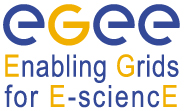Speaker
Report on the impact of the activity, tool or service. This should include a description of how grid technology enabled or enhanced the result, or how you have enabled or enhanced the infrastructure for other users.
EDGeS will enable the transparent sending of applications from EGEE VOs to the interconnected DGs. EDGeS will also establish a new VO in EGEE called as DG VO that will support applications running on the interconnected DGs. In this way EGEE VOs and DGs can mutually exploit spare resources in the other type of grid infrastructure if the source grid is overloaded. EDGeS will support user communities to port their applications either to EGEE or DGs or both. This support includes the validation of the applications and storing them in the EDGeS Application Repository. EGEE user communities can use these applications to run them on the EDGeS infrastructure. EDGeS will provide the DC-API programming interface to port applications to DGs. The gUSE (grid User Support Environment) middleware enables users to develop and run sophisticated workflow applications where nodes of a workflow can be executed either in an EGEE VO or in a DG of EDGeS according to the decision of the built-in gUSE broker.
Describe the added value of the grid for your activity, or the value your tool or service adds for other grid users. This should include the scale of the activity and of the potential user community, and the relevance for other scientific or business applications.
EDGeS will support large number of user communities that require the computing power beyond the existing EGEE VOs. Current applications and user communities that are supported by EDGeS include: medical applications, image processing, bioinformatics, engineering, material science, fusion applications. There are many more potential applications and user communities for whom EDGeS could be extremely useful: computational chemistry, financial risk analysis, math optimization problems, etc. Our experience is that many already existing EGEE user communities can immediately take advantage of using EDGeS and moreover EDGeS can attract new user communities to EGEE whose needs can not be satisfied by the current computing capacity of the average size of EGEE VOs.
Describe the activity, tool or service using or enhancing the EGEE infrastructure or results. A high-level description is needed here (Neither a detailed specialist report nor a list of references is required).
Data challenge applications that require much more computing power than it is available inside one EGEE VO can access additional computing power via public volunteer desktop grids (DGs) and campus DGs that are connected to EGEE. EDGeS will extend the EGEE infrastructure with 4 volunteer DGs and 2 campus DGs including overall more than 100.000 desktop machines. EDGeS will support the EGEE user communities to port their application for the EDGeS infrastructure.
Abstracts for online demonstrations must provide a summary of the demo content. Places for demos are limited and this summary will be used as part of the selection procedure. Please include the visual impact of the demo and highlight any specific requirements (e.g. network connection). In general, a successful demo is expected to have some supporting material (poster) and be capable of running on a single screen or projector.
During the online demonstration we are going to show how to develop/port applications to the EDGeS infrastructure, how to validate and store EDGeS applications in the EDGeS repository and how to execute and monitor the execution in EDGeS. The tools and services that are shown during the demo include:
1. XtremWeb user interface to develop XtremWeb DG applications
2. DC-API to develop BOINC DG applications
3. gUSE to develop and run workflow applications on both EGEE and DGs
4. the EDGeS repository to store the validated applications that can run on EDGeS
5. the application development service
6. the application validation service
Some selected applications will be shown to illustrate how to use the tools and services mentioned above by the EGEE user communities.




